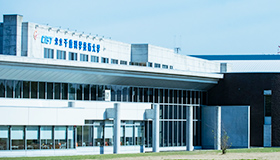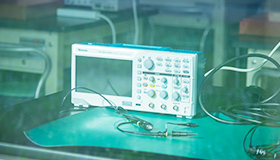Curriculum of the Department of Opto-Electronic System Engineering
Home - English - Undergraduate and graduate schools - Faculty of Science and Technology - Department of Opto-Electronic System Engineering - Curriculum of the Department of Opto-Electronic System Engineering
Features of the curriculum
This curriculum provides students opportunities to acquire practical development abilities while learning the basics of electrical and electronic engineering as well as optical technology. The aim is to nurture individuals who can handle the needs of the times.

Students learn the basics of electrical and electronic engineering, communication engineering, robot and other measurement control/system engineering, and the software technology involved in a well-balanced manner.
Ultimately, students master the basics of “craftmanship” that corresponds to the information society.
The curriculum is designed to expose students to consistent education and research in cross-disciplinary academic fields centered on electrical and electronic engineering and optical technology as well as hardware systematization technology in an integrated manner.
In this way professionals with a wide range of knowledge and applied skills are trained to support “system building” for the next era.
At the same time, students master the basics of information and communication science, basic computer skills, and acquire practical development skills.
Students also develop “the ability to see the entire system” through extensive experiments and research.
Ultimately, students master the basics of “craftmanship” that corresponds to the information society.
The curriculum is designed to expose students to consistent education and research in cross-disciplinary academic fields centered on electrical and electronic engineering and optical technology as well as hardware systematization technology in an integrated manner.
In this way professionals with a wide range of knowledge and applied skills are trained to support “system building” for the next era.
At the same time, students master the basics of information and communication science, basic computer skills, and acquire practical development skills.
Students also develop “the ability to see the entire system” through extensive experiments and research.
Outline of subjects
●Compulsory subject ★Elective compulsory subject ■Elective subject
Second year
Learning goal
To learn the basics of a wide range of specialized fields, from mathematical techniques to essential knowledge of the information societyCommon subjects
●Computer Programming 1 and 2 ●Introduction to Computer System ●Optical System Experiments ●Introduction to Ubiquitous Networks
●Digital Circuits ●Analog Circuits ●Introduction to Control Engineering ●Fourier Application ●Vibration and Wave Theory
■Environmental Science ■Systems Engineering ■Electromagnetism ■System Statistics ■Introduction to Numerical Calculation ■Optics
■Discrete Mathematics ■Information and Occupation ■Information Security ■Introduction to Algebra
●Digital Circuits ●Analog Circuits ●Introduction to Control Engineering ●Fourier Application ●Vibration and Wave Theory
■Environmental Science ■Systems Engineering ■Electromagnetism ■System Statistics ■Introduction to Numerical Calculation ■Optics
■Discrete Mathematics ■Information and Occupation ■Information Security ■Introduction to Algebra
Third year
Learning goal
To learn field-specific expertise and acquire the necessary engineering qualificationsOptoelectronics field
●Electro-optical Engineering Experiments ●Electro-optical Engineering Project ■Quantum Mechanics ■Photonics Device
■Semiconductor Device Engineering ■Introduction to Quantum Electronics ■Nanophotonics Device
■Semiconductor Device Engineering ■Introduction to Quantum Electronics ■Nanophotonics Device
Communication and robotics communication
■Electromagnetic Wave Engineering ■System Control Theory ■Image Engineering ■Optical Fiber System ■Robotics ■Information and Communication Network Engineering
Common subjects
●Digital Signal Processing ●Computer Application ●Electronics Design
■Semiconductor Basics ■Photonics Measurement ■Theory of Japan-China Culture Comparison ■Internship ■Simulation Engineering
■Electronics Measurements ■Microcomputer Training ■Medical Laser Engineering ■Semiconductor Science
■Introduction to Geometry ■Statistical Analysis ■User Interface ■Sensor Engineering ■Algebra I
■Education and Computer ■Corporate Literacy
■Semiconductor Basics ■Photonics Measurement ■Theory of Japan-China Culture Comparison ■Internship ■Simulation Engineering
■Electronics Measurements ■Microcomputer Training ■Medical Laser Engineering ■Semiconductor Science
■Introduction to Geometry ■Statistical Analysis ■User Interface ■Sensor Engineering ■Algebra I
■Education and Computer ■Corporate Literacy
Fourth year
Learning goal
To set a goal and apply researchCommon subjects
●Optical System Journal Club ■Optical System Seminar ■Graduation Research A and B ■Complex Functions and Special Functions
■Geometry I ■Geometry I Exercise
■Geometry I ■Geometry I Exercise
Featured subjects
Electro-optical Engineering Experiment (third year)
Students acquire the knowledge to design and evaluate electronic and optical devices as required for optical system technology, as well as the expertise and technology to combine hard- and software for systematization.
After processing data using spreadsheet software, students perform 3D drafting by 3D-CAD, circuit manufacturing, optical-related observation and measurement, and optical device manufacturing experiments.
After processing data using spreadsheet software, students perform 3D drafting by 3D-CAD, circuit manufacturing, optical-related observation and measurement, and optical device manufacturing experiments.
Optical Fiber System (third year)
Students acquire the basic technology and practical application technology essential for engineers involved in optical communication.
The aim is to acquire basic design skills by studying the basics of optical fiber communication, the technologies to build communication systems, the roles of the components and the systems actually used, and understanding the mechanism of optical fiber communication in detail.
The aim is to acquire basic design skills by studying the basics of optical fiber communication, the technologies to build communication systems, the roles of the components and the systems actually used, and understanding the mechanism of optical fiber communication in detail.
Microcomputer Training (third year)
Students master the basics of microcomputer development that supports cutting-edge digital devices.
The AD/DA functions for inputting and outputting analog signals provided by microprocessors and digital input and output are studied. This is a hands-on class using a computer for each student.
The AD/DA functions for inputting and outputting analog signals provided by microprocessors and digital input and output are studied. This is a hands-on class using a computer for each student.




